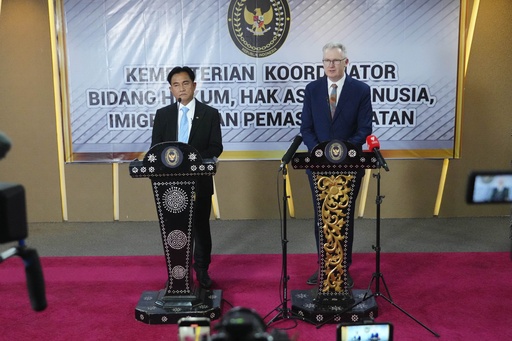
JAKARTA, Indonesia — The five remaining Australians from the Bali Nine, who are currently serving life sentences for drug smuggling in Indonesia, may be repatriated to Australia this month. This potential transfer comes as both countries finalize a draft proposal, according to Indonesia’s senior law minister.
Indonesian authorities are waiting for an official response from Australia regarding several critical aspects of the transfer arrangements. Key considerations include Australia’s acknowledgment of Indonesia’s sovereignty, respect for its judicial decisions, and an assurance that the prisoners will retain their status after returning to their home country, as detailed by Yusril Ihza Mahendra during a press conference.
Mahendra expressed hope for a mutual understanding and a swift agreement on the draft, wishing to conclude the details by December. This statement followed a meeting with Australian Home Affairs Minister Tony Burke in Jakarta. Burke characterized the proposal as a meaningful advancement and a demonstration of goodwill, stating that both countries would address any outstanding issues promptly.
In a separate appeal last month, Australian Prime Minister Anthony Albanese urged Indonesia’s new President Prabowo Subianto to allow for the repatriation of the remaining individuals.
Previously, Andrew Chan and Myuran Sukumaran, two leaders of the Bali Nine, were executed by firing squad in 2015, a move that escalated diplomatic tensions between Indonesia and Australia. Another member, Tan Duc Thanh Nguyen, passed away from cancer while incarcerated in May.
The Bali Nine, arrested in 2005 for attempting to smuggle 8.3 kilograms (18.3 pounds) of heroin from Bali to Australia, have faced strict penalties under Indonesia’s severe drug laws. The remaining five members are serving life sentences without the prospect of parole, while Renae Lawrence, the only woman in the group, was released and returned to Australia in 2018.
Currently, Si Yi Chen and Matthew Norman are detained at Bali’s Kerobokan Prison, while the others have been relocated to different penitentiaries. Over the years, they have continually sought clemency in hopes of a reprieve before Indonesia’s Independence Day, but their requests have consistently gone unanswered, underscoring the nation’s firm stance on drug-related offenses.
Recently, Indonesia agreed to repatriate a Filipino citizen on death row for drug charges, who narrowly avoided execution after prolonged appeals from the Philippines—a situation that exemplifies the complex dynamics of drug crime diplomacy in the region.
